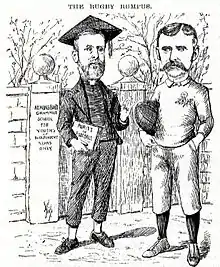Frank Marshall (rugby referee)
Francis Marshall known as Frank Marshall (1846/7 – 21 April 1906) was a British schoolmaster, cleric and rugby administrator.[2] A fierce advocate of amateurism in the early years of rugby football, his hardline position on payments to players contributed to the schism in the game in 1895 and the birth of the breakaway Rugby League.
Frank Marshall | |
|---|---|
 Rev. Frank Marshall (left) portrayed in a satirical cartoon | |
| Born | Francis Marshall 1846/1847 West Bromwich, Staffordshire, England |
| Died | 21 April 1906, age 59[1] |
| Nationality | Great Britain |
| Occupation | Church of England Minister, Rugby Union referee & Headmaster |
| Known for | Defending the amateur status of Rugby Union in the British Isles |
| Title | Reverend |
Marshall, who opposed the introduction of so-called “broken-time payments”, made by clubs in northern England to compensate working men for wages lost while playing matches, has been described as the “witch-finder general, rooting out incipient professionalism”.[3]
Life
Born in West Bromwich, Marshall attended Brewood Grammar School before studying at St John's College, Cambridge. The headmaster of Almondbury Grammar School, Huddersfield, (now King James's School, Almondbury), Marshall believed rugby was a middle-class pastime. He burnished his reputation as “the man with bell, book and candle facing the evil spirit of professionalism”[4] by banning his own club, Huddersfield, in 1893 for breaching the amateur code.[5]
In literature
Marshall, the author of Football: The Rugby Union Game, first published in 1892, features as a central character in Broken Time,[6] a play by Mick Martin that had its premiere at the Theatre Royal, Wakefield in 2011.
References
- ""Rugby Football Union, Museum"" Publication: Amateurs and Professionals.
- ""The Stage"" newspaper: "Broken Time" review.
- "Death of the Rev. Frank Marshall". The Sportsman (11, 444). 23 April 1906. p. 3 – via British Newspaper Archive.
- Collins, Tony. "Marshall, Francis". Oxford Dictionary of National Biography (online ed.). Oxford University Press. doi:10.1093/ref:odnb/56357. (Subscription or UK public library membership required.)
- Hadfield, Dave. "Lessons that have not been learnt as history repeats itself". The Independent. Retrieved 17 November 2014.
- Collins, Tony (2006). Rugby's Great Split: Class, Culture and the Origins of Rugby League Football. Routledge. ISBN 0415396166.
- Rugby Football Union Museum. "Amateurs and Professionals" (PDF). Rugby Football Union. Archived from the original (PDF) on 29 November 2014. Retrieved 17 November 2014.
- Berry, Kevin. "Broken Time". The Stage. Retrieved 17 November 2014.